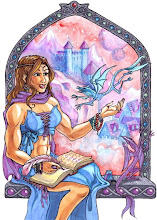I’ve learned a lot a the conventions and conferences I've attended in the last few years and I'd like to share the best bits on my blog whenever I get the time. Today’s post is from a panel at VCON in 2008, my first convention ever. Lucky for me, there were two author guests of honour that year, Kelley Armstrong and Patrick Rothfuss. My experiences at this convention led me to start writing seriously.
In a panel called “Believable Evil,” four panellists discussed evil characters in speculative fiction. Here are some key points I picked up from this panel:
1. Evil people don’ t consider themselves evil. This is what makes them believable.
2. A “good” villain needs clear motivation that not only makes sense to them, the reader can also kind of see their point, even if it’s not necessarily understandable to them.
3. A villain thinks everyone else is the bad guys. They think they are in the right.
4. Things that you don’t expect about or from a villain will make them believable. (ie, they love their dog, they treasure their time with their ailing mother)
5. Avoid the typical rut of fantasy of an ‘evil sorcerer’ trying to destroy the world or the narcissistic villain who’s mean to his minions. Nasty people are good to their friends too.The reader needs to be able to relate to the villain.
Some of the best advice I’ve read on creating great villains can be found on Alexandra Sokoloff’s blog. As a screenwriter and novelist, Alexandra dishes out tricks of screenwriting for the author and that includes how to write an incredible villain. I highly recommend checking out her two part series.
What Makes a Great Villain Part One
What Makes a Great Villain Part Two
Another great resource is The Fire in Fiction by top New York agency owner Donald Maass. Among other excellent advice, he goes into great detail about how to develop your protagonist into a believable character.
I hope these pointers help you develop your villains into believable characters!


0 comments:
Post a Comment